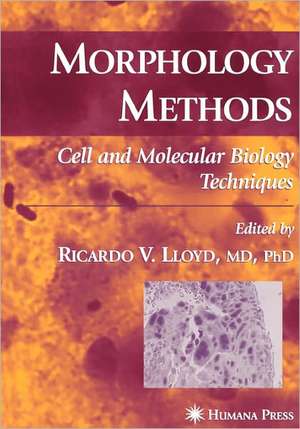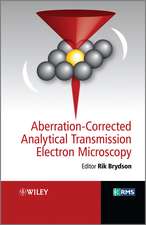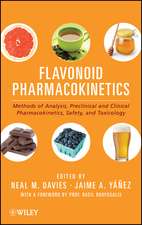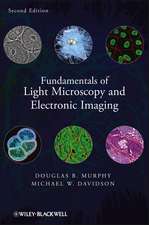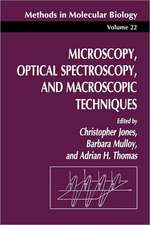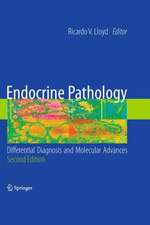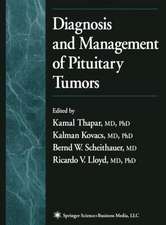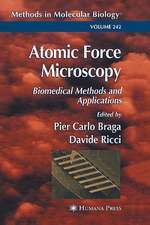Morphology Methods: Cell and Molecular Biology Techniques
Editat de Ricardo V. Lloyden Limba Engleză Paperback – 9 dec 2010
| Toate formatele și edițiile | Preț | Express |
|---|---|---|
| Paperback (1) | 793.07 lei 6-8 săpt. | |
| Humana Press Inc. – 9 dec 2010 | 793.07 lei 6-8 săpt. | |
| Hardback (1) | 1117.65 lei 6-8 săpt. | |
| Humana Press Inc. – 15 iun 2001 | 1117.65 lei 6-8 săpt. |
Preț: 793.07 lei
Preț vechi: 834.80 lei
-5% Nou
Puncte Express: 1190
Preț estimativ în valută:
151.77€ • 157.87$ • 125.30£
151.77€ • 157.87$ • 125.30£
Carte tipărită la comandă
Livrare economică 14-28 aprilie
Preluare comenzi: 021 569.72.76
Specificații
ISBN-13: 9781617372735
ISBN-10: 1617372730
Pagini: 448
Ilustrații: XVI, 422 p.
Dimensiuni: 178 x 254 x 24 mm
Greutate: 0.77 kg
Ediția:Softcover reprint of hardcover 1st ed. 2001
Editura: Humana Press Inc.
Colecția Humana
Locul publicării:Totowa, NJ, United States
ISBN-10: 1617372730
Pagini: 448
Ilustrații: XVI, 422 p.
Dimensiuni: 178 x 254 x 24 mm
Greutate: 0.77 kg
Ediția:Softcover reprint of hardcover 1st ed. 2001
Editura: Humana Press Inc.
Colecția Humana
Locul publicării:Totowa, NJ, United States
Public țintă
Professional/practitionerCuprins
1 Introduction to Molecular Methods.- 2 Laser Capture Microdissection: Principles and Applications.- Protocol: H&E Staining.- Protocol: Operating the PIX Cell System.- Protocol: DNA Extraction from Collected Cells.- Protocol: RNA Extraction from Collected Cells.- 3 In Situ Hybridization: Detection of DNA and RNA.- Protocol: In Situ Hybridization.- 4 In Situ Detection of Infectious Agents.- Protocol: Detecting Adenovirus.- Protocol: Epstein-Barr Virus (Eber I/II).- 5 Fluorescent In Situ Hybridization.- Protocol: FISH.- 6 Practical Applications of the FISH Technique.- Protocol: Metaphase Analysis from Whole Blood Culture.- Protocol: Metaphase Analysis from Solid Tumors.- Protocol: Interphase Analysis on Cell Imprints—Cytology Specimens.- Protocol: Interphase Analysis of Formalin-Fixed Paraffin-Embedded Tissues.- 7 Tyramide Amplification Methods for In Situ Hybridization.- Protocol: TSA by Rapp et al., 1995.- Protocol: CARD/TSA with Nanogold.- Protocol: Tyramide-enhanced FISH with Peroxidase-labeled Oligonucleotides.- 8 Protocols: Ultrastructural In Situ Hybridization.- 9 Quantitation of In Situ Hybridization Analysis.- 10 Protocols: Confocal Laser Scanning Microscopy.- 11 Protocols: Polymerase Chain Reaction.- 12 Protocols: Detection of Nucleic Acids in Cells and Tissues by In Situ Polymerase Chain Reaction.- 13 Immunohistochemistry: Theory and Practice.- 14 Antigen Retrieval Technique for Immunohistochemistry: Principles, Protocols, and Further Development.- Protocol: Antigen Retrieval (AR) Technique.- 15 Tyramide Amplification in Immunohistochemistry.- Protocol: CARD Immunohistochemistry.- 16 Application of Immunohistochemistry in the Diagnosis of Lymphoid Lesions.- 17 Applications of Immunohistochemistry in the Diagnosis of Undifferentiated Tumors.- 18 Applicationsof Immunohistochemistry in the Diagnosis of Endocrine Lesions.- 19 Ultrastructural Immunohistochemistry.- Protocol: Ultrastructural Immunohistochemistry.- 20 Protocols: Clonality Analysis.
Recenzii
"The book nicely covers the hot topics in this area -- laser capture microdissection, in situ hybridization, FISH, tyramide amplification methods, etc. An attractive feature of this book is that the last 10 chapters (of the 20) contain actual "cookbook" protocols (e.g., PCR, confocal laser scanning microscopy, immunohistochemistry, antigen retrieval, etc.) that can be adapted immediately to any laboratory...This book would be useful for those needing a concise reference for how to perform modern molecular tissue-based technology. " -Doody's Health Science Book Review Journal
"This book describes in detail new methods employed in the study of molecular morphology as a basis for the study of human genes and the etiology of diseases. Among the methods are in situ hybridization, in situ detection of infectious agents, the "FISH" technique, PCR, immunocytochemistry, etc. This excellent production has many photos, some in color, and tables and figures. Very useful to those wishing to employ these techniques." - Journal of Pediatric Endocrinology and Metabolism
"This book describes in detail new methods employed in the study of molecular morphology as a basis for the study of human genes and the etiology of diseases. Among the methods are in situ hybridization, in situ detection of infectious agents, the "FISH" technique, PCR, immunocytochemistry, etc. This excellent production has many photos, some in color, and tables and figures. Very useful to those wishing to employ these techniques." - Journal of Pediatric Endocrinology and Metabolism
Textul de pe ultima copertă
Molecular and cell morphological methods have increased rapidly in number and versatility in recent years and, with the completion of the human genome project, will come into much greater demand for the study of human genes and diseases. In Morphology Methods: Cell and Molecular Biology Techniques, Ricardo Lloyd, md, phd, provides critical and tutorial surveys of the cutting-edge molecular and cell biologic techniques used today in the analysis of cells and tissues in situ. These molecular-based histologic and morphologic techniques are described in step-by-step detail by hands-on experts, often those who have originated or perfected them. Among the techniques presented are laser capture microdissection, in situ hybridization, FISH, confocal laser scanning microscopy, in situ PCR, and tyramide amplification. Applications include the detection of infectious agents and DNA, the diagnosis of undifferentiated tumors and endocrine lesions, the metaphase analysis of whole blood cultures, and clonality analysis. Valuable notes on potential pitfalls and practical tips designed to ensure success are included with each method.
In its integrated, state-of-the-art approach, Morphology Methods: Cell and Molecular Biology Techniques thoroughly details and applies the rich panoply of significant new cell and molecular biologic technologies to all the major problems confronting morphologic studies and diagnostic pathology today.
In its integrated, state-of-the-art approach, Morphology Methods: Cell and Molecular Biology Techniques thoroughly details and applies the rich panoply of significant new cell and molecular biologic technologies to all the major problems confronting morphologic studies and diagnostic pathology today.
Caracteristici
Includes supplementary material: sn.pub/extras
